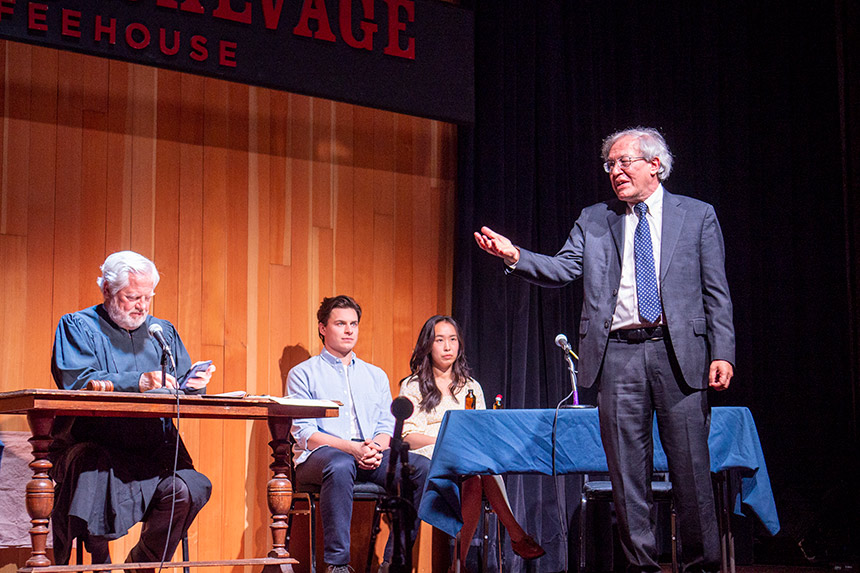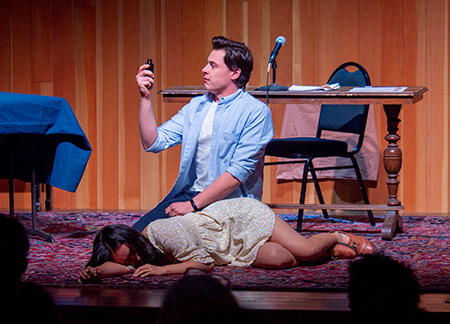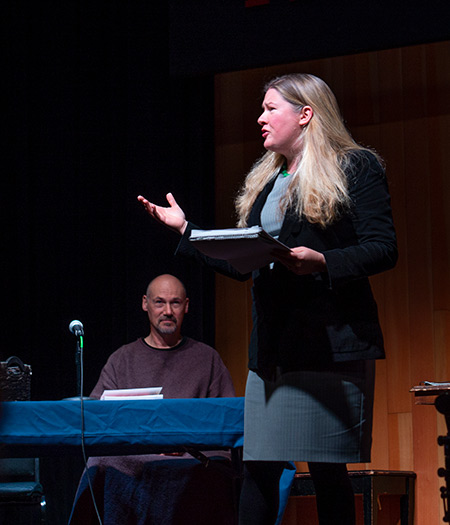
By Andrew Cohen
With his recent reappointment to a second five-year term as Berkeley Law’s dean, Erwin Chemerinsky won’t be leaving for a thespian career anytime soon. But given the popularity of his annual appearances at the school’s innovative blend of Shakespeare theater and legal argument, it could be a viable option down the road.
On March 5, before a rapt audience at Freight & Salvage in downtown Berkeley and online through a YouTube livestream, Chemerinsky took the stage with two other law luminaries and three members of UC Irvine’s New Swan Shakespeare Company for Romeo, Juliet, and the Case of Friar Laurence.
After actors Andrew Borba (Friar Laurence), Crystal Kim (Juliet), and Kieran Barry (Romeo) performed three powerful scenes from the play, the case against the friar — claims of involuntary manslaughter and child endangerment — began. Chemerinsky played prosecutor, Stanford Law Professor Bernadette Meyler defended the friar, retired U.S. District Court Judge Andrew Guilford presided over the proceedings, and the audience served as jury.
See a video of the performance here.
In 2019 and 2020, Chemerinsky argued against UC Irvine Law Dean L. Song Richardson in The Shylock Appeal — a comparable performance based on Shakespeare’s The Merchant of Venice — once in Irvine and once in Berkeley. He has also participated in productions based on Hamlet (2018 in Irvine) and Julius Caesar (last year on Zoom).
This year’s show dove into what some consider Shakespeare’s most iconic play.
“We’re here because two children, a 13-year-girl and a 16-year boy, died tragically and unnecessarily,” Chemerinsky said. “We’re here because the law requires we hold responsible an individual who endangered these children and contributed to their deaths. We’re here because it’s important that you send a message that we’re each responsible for our words and our deeds. This is a message as important if not more important today than even centuries ago.”
Star-crossed lovers
In the play, Friar Laurence is a close friend of Romeo’s who helps him marry Juliet — in secret — because the youths belong to feuding families. After Romeo is banished for his role in killing Juliet’s cousin Tybalt (avenging his role in the death of Romeo’s good friend Mercutio), the friar makes a potion for Juliet to make her appear dead.

The plan is for Romeo to go to her tomb and then escape with an awakened Juliet, but the friar’s letter explaining that never reaches him. When Romeo finally arrives and sees Juliet in a corpse-like state, he thinks she’s dead and drinks poison to kill himself. Friar Laurence enters a moment too late, sees Romeo’s corpse lying by Juliet, asks Juliet to leave — then flees himself — before Juliet eventually commits suicide with Romeo’s dagger.
“I would suggest to you that everything Friar Laurence did in Romeo & Juliet is the very essence of child endangerment,” Chemerinsky said. “Giving to Juliet a powerful narcotic to put her in a deep coma — was he a doctor, giving this anesthesia to Juliet before a medical proceeding? … Imagine someone today in Berkeley or Palo Alto giving a child a powerful drug or liquor putting the child in a deep coma. Wouldn’t you on that same basis say that’s child endangerment?”
Citing California law and passages from Romeo & Juliet, the lawyers each made 15-minute arguments and had five minutes for rebuttal.
Chemerinsky noted that Friar Laurence’s intentions had no bearing on the case, as it is not necessary to prove intent for either charge. For child endangerment, he explained, someone is guilty who willfully causes or permits a child to be placed in a situation where the child’s person or health is in danger.
Meyler characterized the friar as a peacemaker and a consoler, and praised him for taking a crowbar to release Juliet from her tomb after realizing his message had not been delivered to Romeo. She added that Friar Laurence “had on his hands two teenagers who had threatened suicide multiple times” and “acted with due care under very challenging and exigent circumstances — far from negligent.”
Casting blame elsewhere
Arguing that others were more culpable for the children’s deaths, Meyler mentioned Tybalt, “whose readiness to draw his weapon and assault Mercutio set in process this whole tragic chain of action.” She also chided Verona’s ruling prince for failing to keep order in the city, the apothecary who illegally sold poison to Romeo, Friar John for not delivering the letter to Romeo, and even Romeo himself, “who should have left Mercutio’s punishment to the state rather than take it on himself.”

“In the course of human events, tragedies occur that are more a matter of fate than of human agency,” Meyler said. “Sometimes, the fault does lie in the stars.”
Chemerinsky countered by noting how Friar Laurence fled the tomb and didn’t take Romeo’s dagger when he did, even though Juliet had told him she’d take her own life if they couldn’t be together.
“Think about what he did step by step,” Chemerinsky said. “He marries a 13-year-old girl and a 16-year-old boy without the consent of their parents — by the way, that violates California law. Romeo has been banished for killing someone else, and the friar hides him — that’s a felony in California. But then he comes up with this idea that he’s going to give Juliet this narcotic drug that puts her in a deep coma, send Romeo away, then Romeo can come back and when everyone thinks Juliet is dead, they can then run away together.
“There’s a technical term for such an idea in the law: a really dumb-ass idea.”
The majority of the audience agreed. After in-person and online votes were tabulated while the actors performed another scene, Friar Laurence was found guilty of involuntary manslaughter in a close vote and guilty of child endangerment in a lopsided tally.